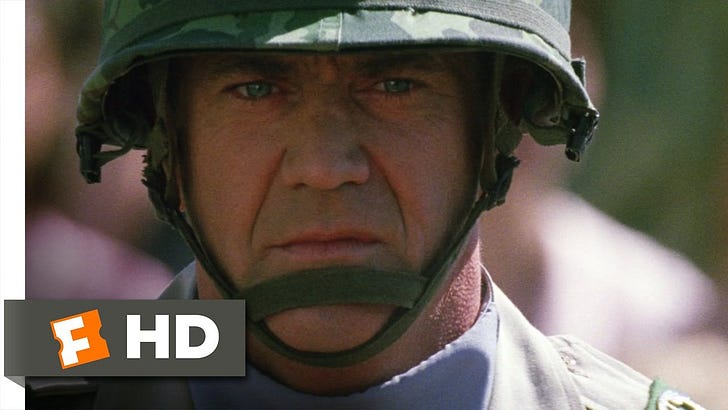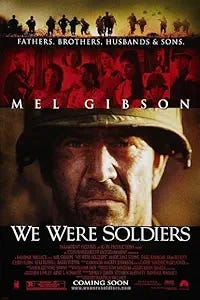Happy (belated) Veterans Day. Apologues for not getting this our on Monday. I have been laid a little low with an annoying cough courtesy of my kids and the weather getting colder here in New York. Be sure to thank those who’ve served for their service, and remember the debt we all owe them for this terrific country we are blessed to live in.
In honor of Veterans Day, today’s Movie Life Lesson comes from one of my favorite, and I think underrated, war movies, “We Were Soldiers” written and directed by Randall Wallace and starring Mel Gibson, Sam Elliot, and Madeline Stowe.
Lesson: Lead by Example
“I can't promise you that I will bring you all home alive. But this I swear, before you and before Almighty God, that when we go into battle, I will be the first to set foot on the field, and I will be the last to step off.”
In the Randall Wallace-written and directed movie We Were Soldiers, starring Mel Gibson, we're told the true story of American soldiers’ first encounter with the Viet Cong in the Battle of the Ia Drang Valley. The movie, rarely listed among the best war films, is one of my favorites.
Gibson’s portrayal of Colonel Hal Moore captures a true commander who leads by example, embodying strength, duty, and sacrifice.
After training his men and despite the challenges imposed by military leadership often disconnected from the realities on the ground, Moore makes his men a solemn promise: he will be the first man on the battlefield and the last man off. He can’t promise they will all come home alive, but he vows they will all come home.
I'm a big fan of Randall Wallace as a writer and director. His memoir, Living the Braveheart Life is a call to live with courage, faith, and heart. Wallace dives deep into life’s toughest truths—mortality, love, betrayal—and shows that real strength comes from facing them head-on. Faith, for him, is built through struggle, and love is more than just comfort; it’s the fierce, unbreakable force that carries us through the hardest times.
Wallace champions a life lived with purpose and integrity, one where we have the courage to challenge norms and transform pain into growth. His “Braveheart life” isn’t about easy choices; it’s about following your heart, risking everything for what you believe in, and standing strong in your own truth. It’s a hard road, but, as Wallace says, it’s the only life truly worth living.
I also admit to being a fan of Mel Gibson, despite his personal flaws. His movies have entertained me for years, and he has a knack for tapping into characters who are willing to sacrifice for the values they hold dear. Obviously, there are reasons Gibson is drawn to these characters, which I won't delve into here, but when he is at his best, it's clear those values permeate his movies.
Unlike in Braveheart, where Gibson’s character fights out of personal vengeance, Moore’s fight is rooted in duty and love—for his family, his country, and the soldiers under his command.
The movie makes this clear from the moment Moore lands in the Ia Drang Valley. Faced with an unfamiliar enemy, he doesn’t hang back from the action. From the minute bullets fly and soldiers start falling, Moore remains a steadfast presence—he is in the thick of the battle, strategically guiding his men while wielding his own weapon. He’s not just a commander; he’s a soldier bleeding alongside them.
Example in Contrast
This stands in stark contrast to the Viet Cong commander, who, though a skilled and experienced leader, directs his men from a bunker far from the immediate danger. The film highlights the difference: Moore leads from the front, willing to face the same risks as his men. His approach not only earns loyalty but also sets an example that transcends the battlefield, resonating with anyone in a position of leadership.
Application of the lesson: Leadership on the Field — and at Home.
While military leaders may face literal battlefields, the film reminds us that leading by example applies to all aspects of life. We are commanders in our families, in our communities, and even in moments that may seem insignificant. For Moore, leadership is an all-encompassing role; it doesn’t end when the battle is over.
“Are they going to try and take your life, Daddy?”
Moore’s commitment isn’t limited to the battlefield. He’s shown as a devoted husband and father who respects his family’s fears while not shielding them from the truth. He doesn’t dismiss his daughter’s question about the danger he faces but answers with honesty and care.
Application of the Lesson: Take Responsibility
Just as Moore takes responsibility for his men, we have the opportunity to lead in our families. Being a parent involves teaching, sacrificing, and guiding—preparing our children to face their own battles in life. The battlefield may be different, but the dedication, integrity, and care remain the same.
We see this strength mirrored in Col. Moore’s wife, “Julie Moore”, played by Madeline Stowe. Among the wives, she becomes a quiet leader, embodying the resilience their husbands show on the battlefield.
When the grim task of delivering telegrams to the families of fallen soldiers arises, Julie doesn’t step back or turn away. Instead, she shoulders the heartbreaking responsibility herself, hand-delivering each message, knowing that her presence—her empathy—might be the only comfort these women receive in their darkest hour.
Through this simple but profoundly courageous act, she stands as an unwavering pillar for those around her, leading with the same bravery her husband displays in the field.
Application of the lesson: Faith and Guidance:
2nd Lieutenant Jack Geoghegan: “What do you think about being a soldier and a father?”
Lt. Colonel Hal Moore: “I hope that being good at the one makes me better at the other.”
In a poignant moment, Moore guides a young soldier, “Jack Geoghegan” played by Chris Klein —who’s struggling with the burden of being both a soldier and a new father Without giving a sermon, Moore again leads by example, kneeling beside him in prayer, showing the young man how he reconciles his faith and duty.
Lt. Colonel Hal Moore: Our Father in Heaven, before we go into battle, every soldier among us will approach you each in his own way. Our enemies too, according to their own understanding, will ask for protection and for victory. And so, we bow before your infinite wisdom. We offer our prayers as best we can. I pray you watch over the young Jack Geoghegan. That I lead into battle. You use me as your instrument in this awful hell of war to watch over them. Especially if they're men like this one beside me, deserving of a future in your blessing and goodwill. Amen.
2nd Lieutenant Jack Geoghegan: Amen.
It’s a gesture of empathy and mentorship, reminding us that real leadership isn’t about having all the answers but about standing alongside others in their doubts.
The Cost of Leading by Example - The Ultimate Test of Leadership
“He died keeping my promise.”
The true cost of Moore’s example is seen when in battle, the young soldier-father, inspired by Moore’s words and actions, he makes the ultimate sacrifice, rushing into enemy fire to save a fellow soldier. Tragically, he doesn’t make it back.
After three grueling days of combat, Moore goes out himself to find the two missing soldiers, staying true to his vow. He discovers the young father, identifiable by a bracelet his wife had given him. Moore’s grief is palpable as he recognizes that this soldier’s courage—his choice to live by Moore’s example—has cost him his life.
This sacrifice reflects the burden that true leaders bear: knowing that their example inspires others, even at great cost. Moore’s grief reveals the weight of his own promise and the emotional price of leading by example.
Conclusion
We Were Soldiers reminds us that leadership isn’t about status or authority; it’s about actions, sacrifices, and shared burdens. Randall Wallace’s portrayal of Hal Moore paints a portrait of strength, compassion, and integrity that transcends the battlefield. As we consider the lessons of this powerful story, let’s remember that leading by example—whether in uniform or not—is the highest honor and the greatest test of character.
Like what you see? Become a paying subscriber and get even more exclusive content. From Hollywood blockbusters to life’s biggest plot twists, the Elice Island Newsletter has it all. Your support helps me bring you the very best—straight to your inbox! Because every good story deserves a great ending.




